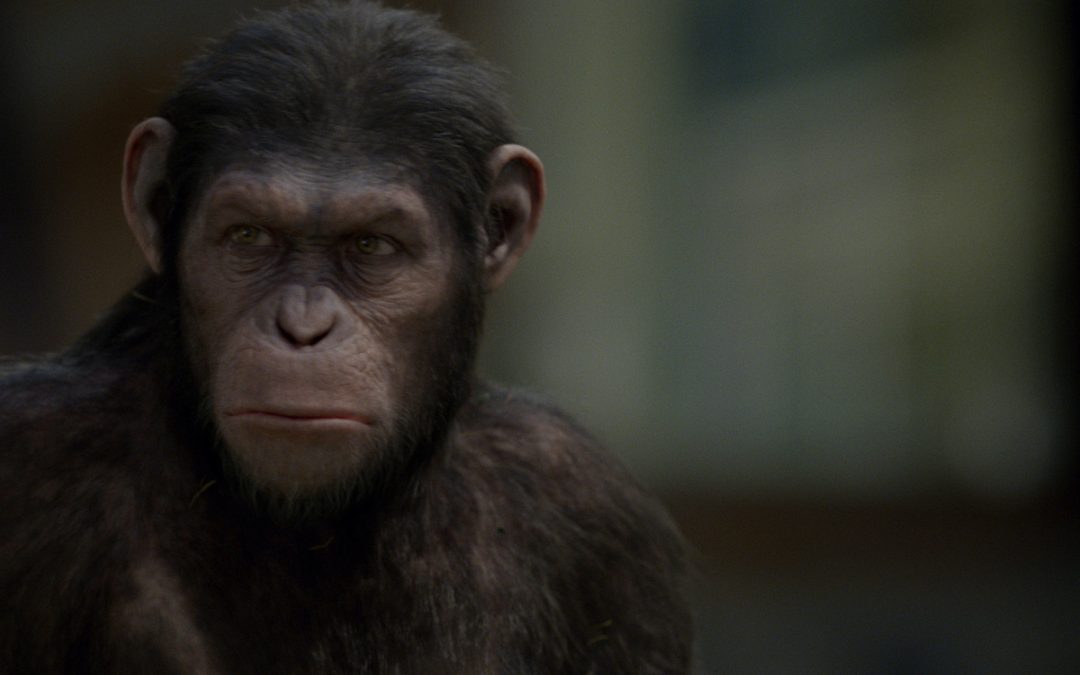I am excited to welcome you to the second half of my film criticism series! Over the last couple months, I have analyzed four different psychological thrillers, ending with a discussion on 12 Monkeys’ negative depiction of humanity and scientific advancement. In keeping with those ideas, I am taking a look at Rupert Wyatt’s Rise of the Planet of the Apes (2011) as a starting point for my examination of the science-fiction genre!
“What is Caesar?” This simple yet philosophically loaded pondering, stemmed from the introspective curiosity of a young chimp with a budding intelligence, becomes the central question of Rise of the Planet of the Apes, the remarkably pensive prequel to Franklin J. Schaffner’s iconic 1968 picture. Just what is Caesar (Andy Serkis), an ape who has been given humanlike intelligence? Is he still just an ape? Is he a person? If so, then what are we? What makes a person? These lead to more daunting questions: what gives humans the right to claim the earth as their own? What gives them the right to meddle with other species in their own interest? While humans by and large see themselves as the rightful rulers of the earth, Rise of the Planet of the Apes spotlights their cruelty and challenges popular ideas regarding personhood in order to posit that humanity does not deserve its rulership.
Rise’s focus on the mistreatment of animals by humans suggests that the latter are undeserving of the power they hold over the former. In the very first scene, a community of chimpanzees is peacefully roaming the woods when they are ambushed by a group of men who chase them down. Three chimps are trapped, boxed up, and stolen away from their families. The camera takes their perspective, allowing the viewer to feel their anxiety, fear, and eventual despair. Just as the chimp Bright Eyes (Terry Notary) has been trapped in a box, the frame itself is boxed in, evoking a claustrophobic feeling as we see her last glimpse of her family through a rectangular hole. The next scene reveals the reason for her capture: scientific experimentation. Just as with Dr. Goines’ (Christopher Plummer) labs in 12 Monkeys (1995), the people working at Gen-Sys have taken these creatures from their homes, using them as involuntary test subjects in the name of scientific advancement with no regard for the pain and discomfort it causes them. When Bright Eyes escapes containment for fear of the scientists hurting her new child (who would later be known as Caesar), she is ruthlessly shot six times by a security officer. And this is all within the first ten minutes. Throughout the film, apes are constantly imprisoned, abused (for scientific reasons or just for fun), and killed by humans who do not give it a second thought. One cannot help but wonder what gives mankind the moral right to treat other creatures in this way.
These doubts are exacerbated by the way in which Rise ponders on the definition of personhood, calling into question whether humans ought to be the only species it is afforded to. Opposite to the way in which humans are depicted as barbaric and selfish, apes are consistently shown to be innocent, compassionate, and sympathetic. They have feelings just like humans do, and they care for each other deeply. And with the element of science fiction—the consciousness-expanding ALZ-112—they become just as smart as humans, too. Yet, they are treated as lesser beings. Even Will Rodman (James Franco), the character who is most sympathetic to the apes and has raised Caesar as his own son, still treats him like a pet, requiring him to stay inside the house except when Will takes him out on a leash. In that pivotal scene, Caesar sees a dog being held by a leash like his and questions for the first time what he is. This display of self-awareness reveals just how intelligent he is and cements his status as a person under the framework of René Descartes’s philosophy, of which the first principle is “I think, therefore I am.” And if an ape can be considered a person, how can we rule over them in good conscience, using and discarding them as we see fit? If there is so little to distinguish us from these creatures, how can we call ourselves people when we treat them as if they are worthless?
Be on the lookout for my next post, in which I’ll be setting my sights on a more recent sci-fi movie with a tad more grandeur: Dune (2021), Denis Villeneuve‘s absolutely stunning epic adapted from one of the most influential works in the genre.


Recent Comments